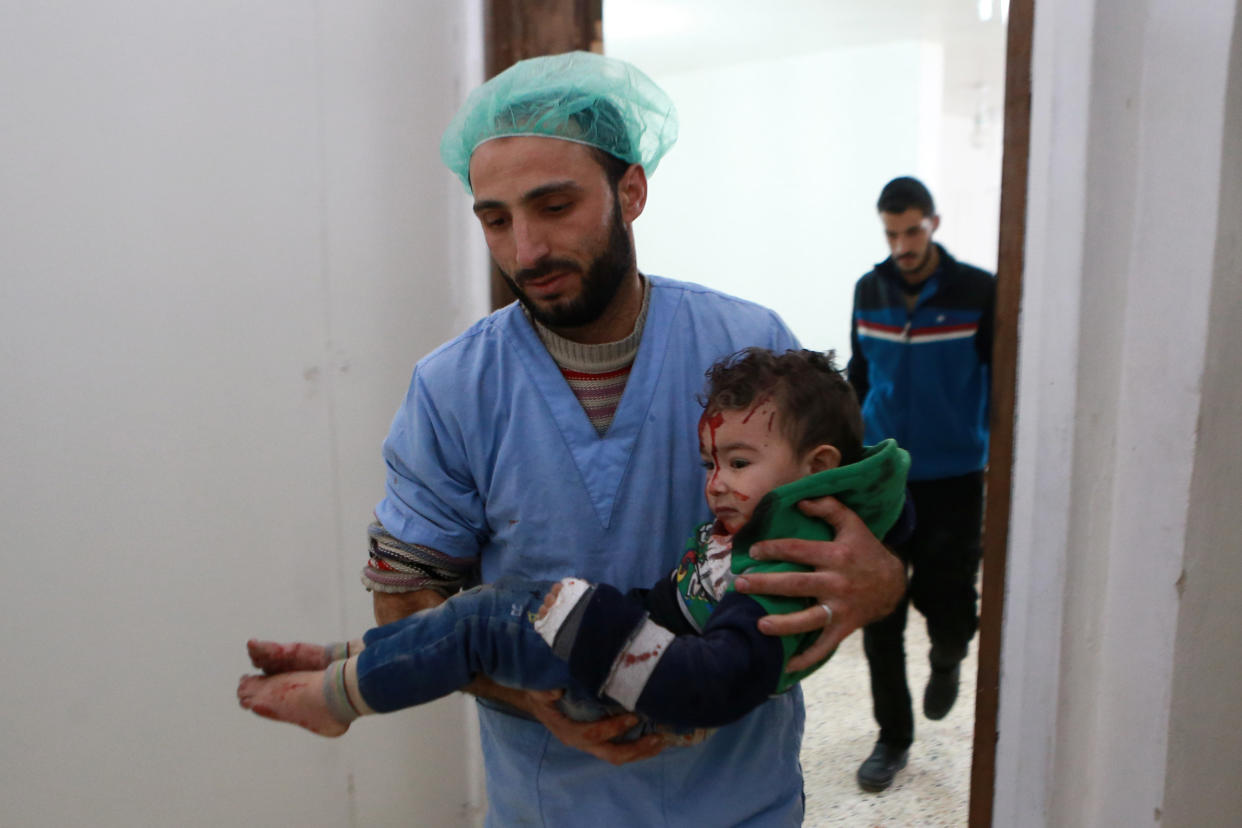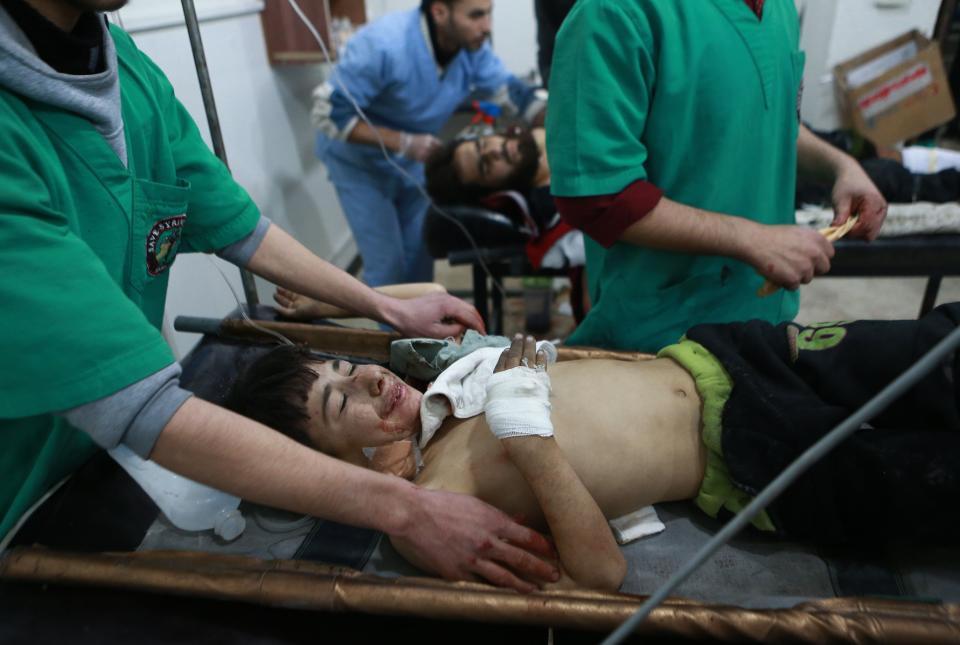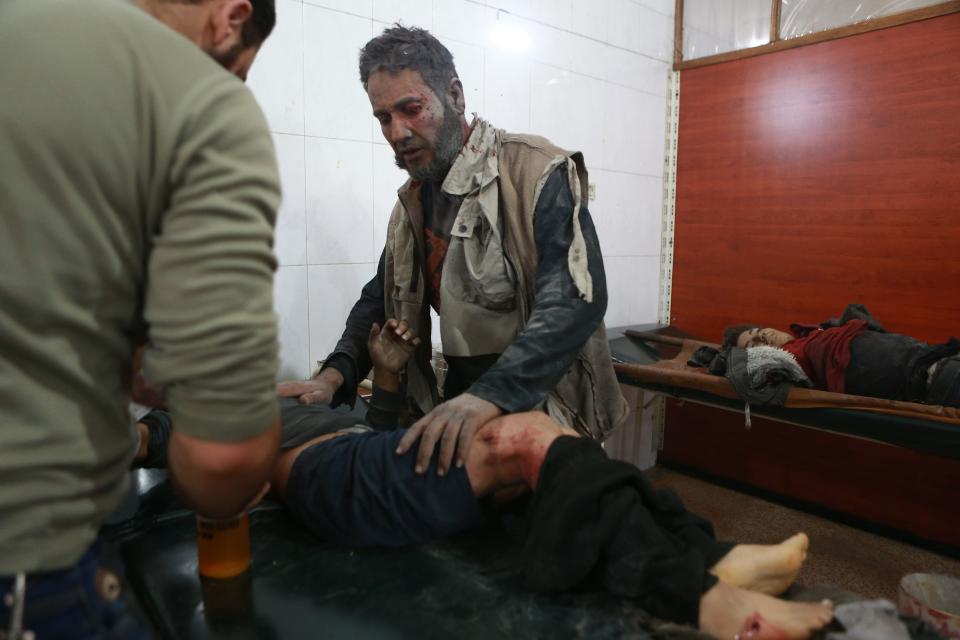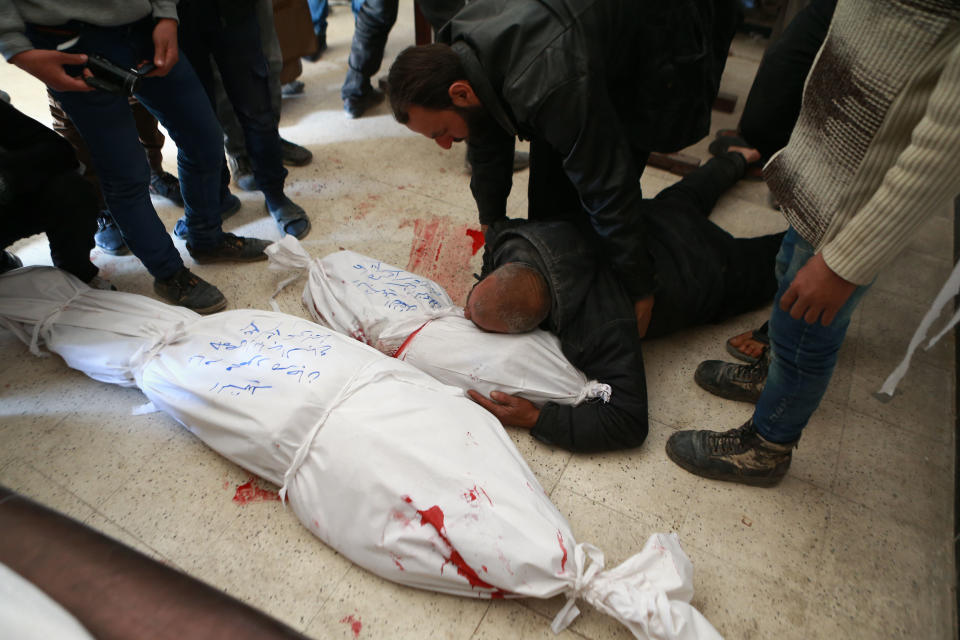Twelve miles from Damascus, rebel holdout faces humanitarian 'catastrophe'

Five hundred critically ill Syrian patients, including scores of young children, are trapped with dwindling access to medical supplies in a besieged rebel-held district northeast of Damascus in what some aid workers are calling a humanitarian catastrophe.
In recent weeks, drawing relatively little international press coverage, forces of the Syrian regime of President Bashar Assad have pounded the area with airstrikes — including cluster bombs — as part of a ferocious assault on eastern Ghouta, just 12 miles from the country’s capital. The region is the larger of two Damascus suburbs still under the control of rebels who have been fighting Assad’s regime for the past six years.
As the government offensive escalates, hundreds of patients in the district who suffer from malnutrition, cancer, kidney failure and other diseases have been unable to receive treatment or evacuate, the aid monitors say, warning that siege conditions verge on famine. The UN declared the situation a humanitarian emergency on Thursday after its top humanitarian advisor, Jan Egeland, called situation a “catastrophe.”

“Siege conditions in Eastern Ghouta are at their worst point since the siege began in 2013,” said Valerie Szybala, director of the Syria Institute, a Washington, D.C., nonprofit that is monitoring the crisis. “Since this summer, we have seen a growing number of civilian deaths due to the lack of access to medical care and malnutrition. With winter beginning, the conditions will only grow worse, as people do not have electricity or fuel to make fires.”

Of the 502 patients who are at most serious risk, 63 are children younger than 5, Dr. Mohamed Katoub of Syrian American Medical Society (SAMS), a nonprofit medical relief organization, told Yahoo News in an interview from Gaziantep, Turkey. In the past, Katoub’s organization was able to treat patients with supplies smuggled in through tunnels connecting the area to the opposition-controlled neighborhoods of Barzeh and Qaboun.
But the Syrian military shut the tunnels in May, and basic medical supplies such as anesthetics and surgical gloves are quickly running out — and the patients have nowhere else to go. “Now we don’t have access for patients to go to Damascus. We don’t have access to medicines to bring inside, so we started seeking evacuation,” said Katoub.

Doctors began requesting evacuations in July. Since then, Katoub says, only eight patients have been evacuated and 11 have died, because diseases that usually can be treated or managed have become fatal. Local doctors must wait for the government to approve aid convoys and ambulances to evacuate patients. Yet only ten aid convoys have passed through the regime checkpoint this year, each delivering barely enough supplies for a month, says Katoub. The regime removes surgical items from the convoys as well, he added — even from caesarean section kits.
One of the families Katoub is most concerned about is in Irbin and has four boys younger than 12 who have hemophilia. Hemophilia, a congenital failure of blood-clotting, was once frequently fatal but now be managed with clotting factor replacement therapy.
But in siege conditions, without treatment, “any wound might be a killer,” said Katoub. “This disease is not killing in other places.” Any medical procedures that can cause bleeding, such as dental work, can become catastrophic.
For Katoub, the frustration is compounded because adequate medical care can be accessed just a few miles away. But evacuation does not guarantee safety for residents from the longstanding opposition stronghold. A 5-year-old boy with a suspected case of polio was one of the few patients moved to Damascus. Born after the siege of Ghouta began, he had no official identification papers. After the hospital told the boy’s father to obtain certain papers, he headed to the civil records office. There, he was arrested.

Though relatively unknown to foreigners before the war, eastern Ghouta has been permanently inked on the map in blood. The agricultural periphery of Damascus emerged as a key battleground against the regime, led by rival rebel groups that eventually came under the control of the Saudi-backed Jaysh al-Islam (Army of Islam). These opposition factions built and operated the tunnels for smuggling that helped sustain the resistance to Assad in his backyard. Rebel groups competed not only with each other, but also with regime-backed war traders running goods and supplies through the Wafideen crossing point into eastern Ghouta.
Eastern Ghouta has paid dearly for its resistance. Residents have endured a grueling siege punctuated by chemical-weapon attacks that horrify the international community but fail to spur action. The population has declined by more than half — from 1.2 million to about 400,00. Since the tunnels were closed, the price of goods has skyrocketed. Last Sunday, the government imposed an exorbitant tax of 2,000 Syrian pounds (a little less than $4) on every kilo of food coming through the regime crossing point.
Eastern Ghouta is one of several de-escalation zones negotiated between Russia, Iran and Turkey in September during the Astana ceasefire talks. Under the agreement, a cessation of hostilities would allow for unimpeded access to humanitarian aid. Instead, the Syrian regime has launched a final campaign to crush the remaining rebel resistance in eastern Ghouta, recalling the brutal offensive to recapture eastern Aleppo last year.

But unlike the outcry that met the regime’s onslaught then, Assad’s final play for eastern Ghouta is unfolding with impunity and in silence. The Trump administration recently ceded to Russia political and military authority to end the war, further closing the door to Western aid and support. “If something is not done immediately, thousands of innocent civilians will die,” said Szybala. “Unfortunately, based on the lackluster response from international actors it seems quite clear that nothing will be done.”
The pattern of political cover repeated last week: Russia proposed a ceasefire, which the Syrian government accepted. Syrian forces bombed eastern Ghouta the next day.
Shilpa Jindia is a Washington, D.C.-based journalist who specializes in Mideast affairs.
Read more from Yahoo News:



